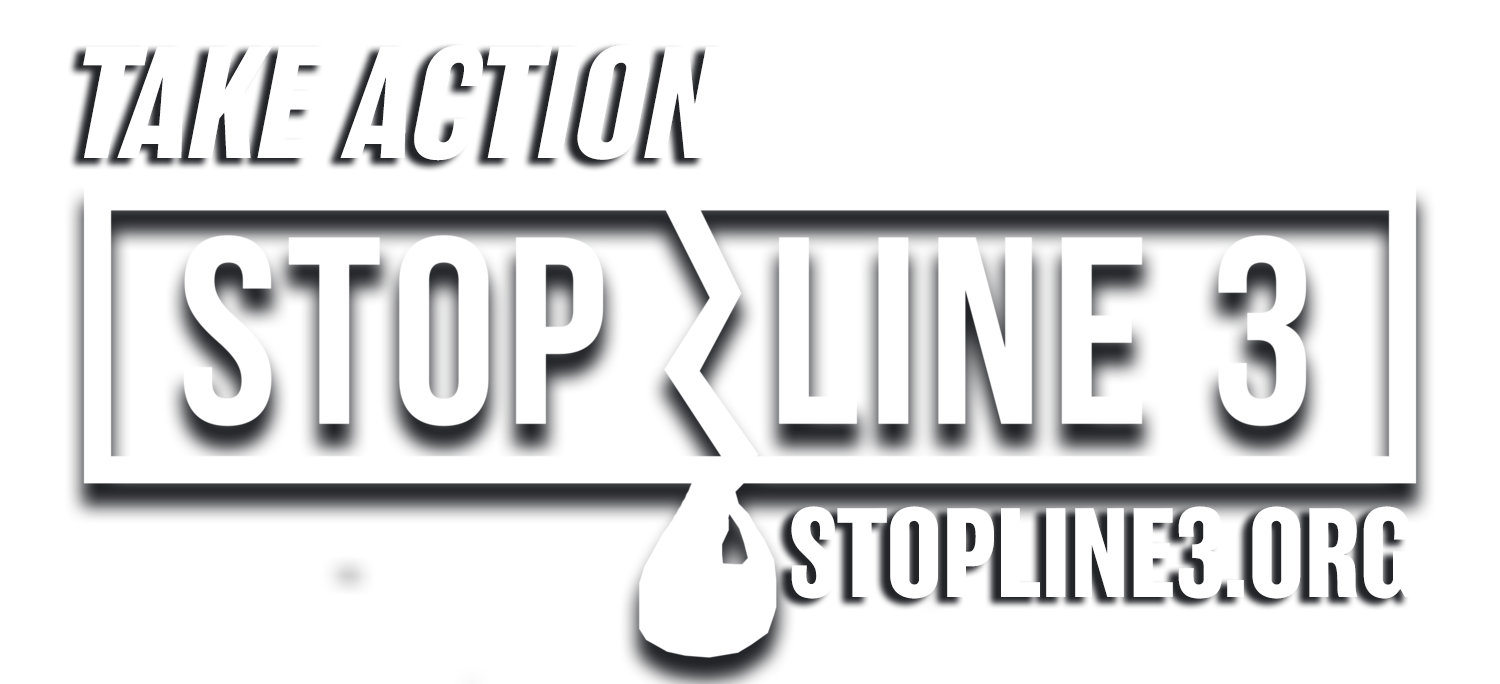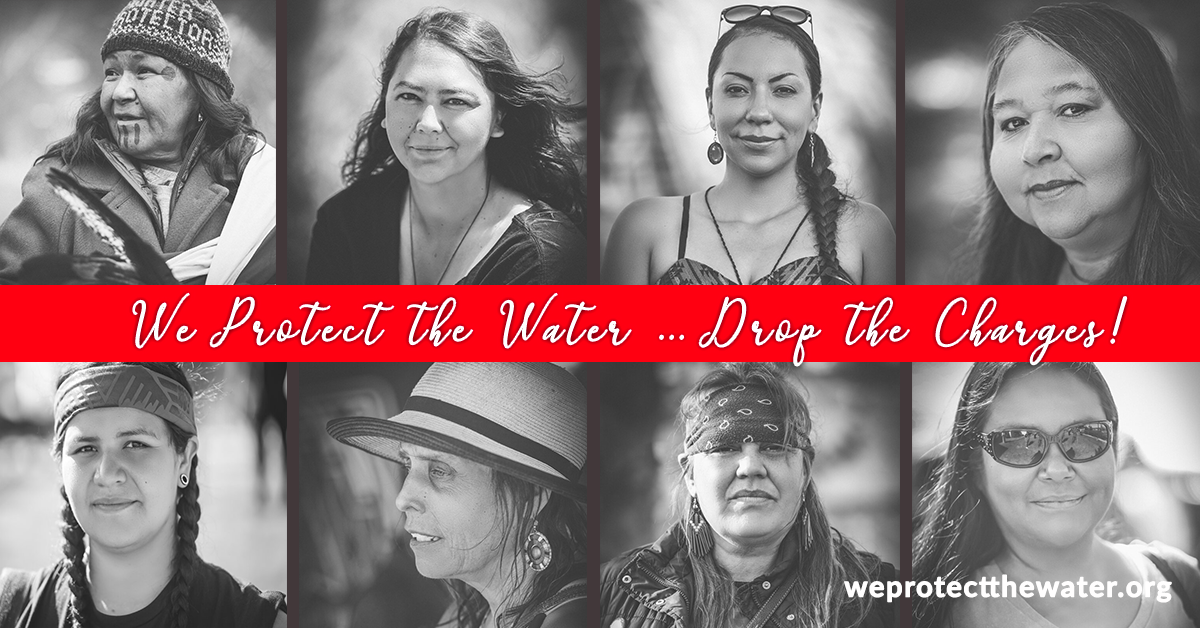‘They criminalize us’: how felony charges are weaponized against pipeline Water Protectors…
Alexandria Herr for Floodlight
Thu 10 Feb 2022 05.00 EST
Twenty states have passed laws that criminalize protesting on ‘critical infrastructure’ including pipelines. In Minnesota, at least 66 felony theft charges against Line 3 protesters remain open
Supported by
Alexandria Herr for Floodlight
Thu 10 Feb 2022 05.00 EST
Last summer Sabine von Mering, a professor of German at Brandeis University, drove more than 1,500 miles from Boston to Minneapolis to protest against the replacement of the Line 3 oil pipeline that stretches from Canada’s tar sands down to Minnesota.
Along with another protester, she locked herself to a semi-truck in the middle of a roadway, according to a filed court brief, as a means of peaceful resistance. But when she was arrested, she was charged with a serious crime: felony theft, which carries up to five years in prison.
“It’s very scary that they criminalize us like that, and to face jail time,” said Von Mering, 54, of her June arrest. “But what can I do? I feel responsible to my kids and future generations.”
The felony charges come as more than a dozen states have passed laws to criminalize fossil fuel protests, and as the federal government has ramped up its own tactics for surveilling and penalizing protesters.
Von Mering is one of nearly 900 protesters who were arrested in Minnesota for protesting against the pipeline’s construction, with the vast majority of arrests taking place during the summer of 2021, and one of dozens facing felony charges. Construction on the Line 3 pipeline was finalized in October 2021 and carries 760,000 barrels of oil per day across northern Minnesota. But its construction for years has stoked fierce protests and legal challenges, led by Indigenous activists in northern Minnesota who worried about potential impacts of oil spills and the pipeline’s threat to treaty rights to gather wild rice.
While most of the arrests have led to misdemeanor or gross misdemeanor charges for crimes including “disturbing the peace” and “trespassing”, felony charges like Von Mering’s mean protesters are facing years of jail time.
Legal advocates say that in Minnesota the elevated charges are a novel tactic to challenge protest actions against pipeline construction. They see them as furthering evidence of close ties between Minnesota’s government and the fossil fuel industry. It follows reporting by the Guardian that the Canadian pipeline company Enbridge, which is building Line 3, reimbursed Minnesota’s police department $2.4m for time spent arresting protesters and on equipment including ballistic helmets. Experts say the reimbursement strategy for arrests is a new technique in both Minnesota and across the US, and there’s concern it can be replicated.
“I do a lot of representation for people in political protests and I’ve never seen anything like that,” said Jordan Kushner, a defense attorney representing clients charged in relation to Line 3 protests.
Two of Kushner’s clients were charged with felony “aiding attempted suicide” charges for crawling inside a pipe. The charge is for someone who “intentionally advises, encourages, or assists another who attempts but fails to take the other’s own life”, according to Minnesota law and carries up to a seven-year sentence. Authorities alleged that the protesters were endangering their lives by remaining inside the pipeline.
“To put it charitably, it’s a very creative use of this law,” said Kushner.
Across the country pipeline protests have faced fierce backlash in various forms by both the oil and gas industry and various state legislators who oppose the often successful protest delay tactics. Since 2017, 20 states have passed laws that criminalize protesting on “critical infrastructure” – a broad category which can include pipelines and oil refineries, depending on the state. Other strategies for discouraging protests have included spying by the Federal Bureau of Investigations (FBI) on Keystone XL opponents in North and South Dakota, and flyovers of protester’s homes by Custom and Border Protection drones.
Outside of the US, authorities in British Columbia have also used arrest and lawsuits as a means to dissuade protests challenging the Coastal GasLink pipeline. At Line 3, protests came to a head last summer when hundreds of protesters were arrested for misdemeanor offenses. But the lawyers representing those arrested say charges began to get more severe, some bordering on the absurd.
At least 91 felony charges were made against 89 protester defendants in Minnesota, according to data compiled by the Pipeline Legal Action Network, a network of lawyers representing Line 3 defendants, and confirmed by the Guardian. It’s likely the number of total felony arrests was higher, as the data does not include all of the arrests made of Indigenous protesters, many who had their cases transferred to tribal courts. At least 66 felony theft charges against Line 3 protesters remain open and ongoing in the Minnesota courts.
“I’ve never seen felony theft and I’ve never seen felony assisted suicide used in environmental protests,” said Tara Houska, a tribal lawyer, activist and citizen of Couchiching First Nation, located along the border between Minnesota and Ontario.
“Some of these charges are a pretty obvious overstep by prosecutors to try and punish people for engaging in demonstration.”
Jason Goward, 37, is another protester who was arrested for felony theft. A citizen of the Fond Du Lac Ojibwe Band located near the pipeline’s terminus in Duluth, Minnesota, Goward first started as a construction worker on the Line 3 pipeline in 2020. Yet, he soon became disturbed by his work. The pipeline crosses through the treaty lands of the Ojibwe tribe and he watched as sandhill cranes – the animals of his grandmother’s clan – fled the construction site. The guilt came to a breaking point and Goward walked off the job to protest. He was arrested last July for locking himself to a piece of pipeline equipment. While his charges were eventually dropped after his case was transferred to Red Lake tribal court, the impacts of the arrest still follow him.
“I still can’t get a job to this day … No one wants to hire someone [arrested for] felony theft,” Goward said. (Background checks routinely flag arrest records, even when charges are dropped.)
Yet Goward says he doesn’t regret his decision to protest against the Line 3 construction.
“What kept me going was knowing that someday my sons, when they come back to the reservation, [will know] that I tried to make sure that the water, the rice, and the nature is clean for them to live off the land,” he said.
Minnesota’s police officers weren’t the only group that sought reimbursement from the pipeline company for time spent processing Line 3 protesters. Minnesota prosecutors also requested payment from Enbridge for their time spent bringing cases against protesters. According to documents obtained by the Center for Protest Law and Litigation, prosecutor Jonathan Frieden – who is overseeing the prosecution of nearly 500 Line 3 cases – invoiced an escrow account funded by Enbridge for $12,207 in 2021. The request was ultimately rejected.
An Enbridge spokesperson, Michael Barnes, said the company does not “determine who broke the law or how they are prosecuted” and said Minnesota’s Public Utility Commission determines what charges are reimbursable. Frieden did not respond to a request for comment.
Mara Verheyden-Hilliard, director of the Center for Protest Law and Litigation warns that the repayment of policing costs by Enbridge creates an “exceptional corruption and perversion of the justice system and of democracy” by “funding law enforcements to act against the political opponents of the corporation”.
Minnesota’s legislature has introduced 17 bills to expand penalties against protesting with six categorized as critical infrastructure bills. One bill introduced in the 2021 legislature but didn’t pass, would have extended the penalty of gross misdemeanor to those who “intentionally” recruited, trained or “conspired” with any trespasser.
Activists are building pressure to drop charges against Line 3 protesters. Others have moved on from Line 3 in Minnesota to protesting against Enbridge’s other oil pipeline, Line 5, in Michigan. But protesters like Von Mering still await their fate in the courts.
“It makes no sense that I have to defend myself against the charge of theft when I’m trying to protect the water,” she said. “They think I’m a criminal. But I’m not.”
CALL ON THE STATE GOVERNMENT TO DROP THE CHARGES
Follow The Guardian for the: America's dirty divide





